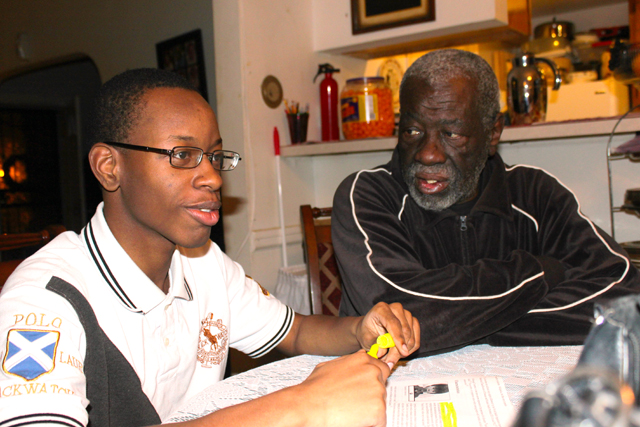D.C. Opportunity Scholarship Program Is Accountable—to Parents
Rachel Sheffield /
The D.C. Opportunity Scholarship Program (DCOSP) has helped hundreds of D.C. schoolchildren leave underperforming public schools to attend schools of their parents’ choice. As The Washington Post reported Sunday about the school voucher program:
In the District, it’s clear that vouchers have provided many children with an education at well-established private schools that otherwise would have been out of reach, and their parents rave about the opportunity.
Interestingly, although the Post’s editorial page has time and again praised DCOSP—defending the scholarship program for low-income families from the Obama Administration’s defunding drive last year—the newsroom suddenly appears bent on branding the scholarship program as “unaccountable.” Sunday’s front-page story loses sight of the big picture and focuses on alleged shortcomings at a couple of the participating private schools.
These schools, the great majority of which are highly regarded Catholic programs, are arguably held to a higher level of accountability exactly because parents are empowered with choice. If a school isn’t meeting a student’s needs—and yes, there will be those schools that do not—parents can choose not to enroll their children.
In the traditional public school system, families—particularly low-income families—have no such sway. They have little choice but to send their children to the neighborhood public school, which will continue to receive funding year after year regardless of performance.
It makes sense that parents would “rave” about the leg up provided by DCOSP. Not only anecdotal evidence but formal evaluations show parents’ satisfaction with the program. For these low-income families, DCOSP is a lifeline out of a failing school system, providing hope that their children can have a better academic future.
Again, children participating in DCOSP come from low-income homes. The vast majority of students participating in the program live in school districts with poorly performing schools.
DCOSP students achieve at higher rates than their peers. According to the U.S. Department of Education’s evaluation of the program, 91 percent of DCOSP students graduate, compared to only 70 percent of their peers from similar backgrounds. Nearly 90 percent of DCOSP students that graduated in 2010 and 2011 enrolled in two- or four-year universities. This is a rate far above the national average of 75 percent and well in excess of graduation rates in D.C. Public Schools.
Although the Post made only a passing comment on this result, it’s important to understand its significance. University of Arkansas professor Patrick Wolf, the lead researcher on the evaluation, explains that high school graduation is the “Holy Grail of educational interventions in the inner city.” High school graduates live longer, earn higher wages, experience lower rates of unemployment, and are less likely to be convicted of a crime. According to Wolf, “If a program boosts the graduation rate, and does nothing else, it’s a success.”
D.C. Public Schools’ achievement levels are tragically low. Only 16 percent of eighth graders are proficient in reading, and graduation rates stagger below the national average, yet these schools receive between $18,000 and $30,000 per pupil annually—some of the highest levels of per-pupil spending in the nation. In contrast, the DCOSP’s per-pupil spending is between approximately $8,000 and $12,000 (depending on a student’s grade level) each year.
D.C. public and charter schools also benefit financially from the voucher law, receiving additional funding under the law in an amount equal to that allocated to DCOSP. However, D.C. public schools and charters have not complied with the law’s requirement to submit a report explaining how funds appropriated under the law “were used in the preceding school year” and “how such funds are contributing to student achievement.”
Similar to DCOSP families highlighted by the Post, numerous other families have benefited from the scholarships. Joe Kelley, a single father, called DCOSP a “blessing” for his children. By the fifth grade, his son Rashawn was three years behind in the public school system. Kelley had to get a court order for the school to provide Rashawn with a tutor after finding out that the school hadn’t fulfilled its requirement to update his son’s individual education plan.
Beyond the academic struggles of his son, Kelley says the school was so bad that “eight police officers patrolled it every day, yet kids were still scared of getting jumped.”
Thankfully, Kelley learned about DCOSP. As a result of receiving a scholarship, Rashawn was able to switch to a private school. He caught up to his grade level within two years. Today, he is a high school graduate and attends the University of the District of Columbia. Kelley has three other daughters who are also benefiting from the scholarship program.
Low-income students should not be confined to failing public schools. DCOSP parents know this, and that’s why so many have fought for this opportunity. All students, regardless of their economic situation, should have the greatest chance for the best educational future possible, and DCOSP is opening wide the doors of educational opportunity for many of D.C.’s most in-need students.
Watch Let Me Rise, a documentary about the DCOSP.

